Emperor
Some guys from Norway who studied a lot of music and came up with a fusion of ancient angst and modern frustrated, hopeless and nihilistic emotion, which they integrated into their primitive black metal, expanding it to an epic style of vastly creative and intelligent music.
Wrath of the Tyrant
Wild Rags
|
1992
|
|
|
Production: Crepitant garage with harangue of overtone but representative and atmospheric fuzz of guitar tone and distortion, with rough aesthetik encompassing the noisy needs of these pieces.
Review: Rampantly evil and obscenely original yet somehow familiar and almost universal music of darkness comes from Emperor, Norwegian bloodhounds of epic stylings in music. These long and gently cruising songs build melody in fast riffing to create atmosphere and then move it, gently and then insanely, through a maze of permutations to let the music build to its full exploration of melody and phrase.
Although perceptibly composed by younger musicians, these tracks demonstrate the quirky brilliance in both music and lyrics that would later make this band a favorite in the black metal crowd. Opening with a moribund and feral ambient introduction leading into the serpentine "Ancient Queen" and then through a panorama of early Emperor.
Tracklist:
1. Introduction
2. Ancient Queen
3. My Empire's Doom
4. Forgotten Centuries
5. Night of the Graveless Souls
6. Moon Over Kara-Shehr
7. Witches Sabbat
8. Lord of the Storms
9. Wrath of the Tyrant
10. Witches Sabbath
11. Ancient Queen
Length: 42:13
N.B.: tracks 10 and 11 are later reworks of those songs.
|

Copyright © 1992 Wild Rags
|
This band creates music by enwrapping a simple melodic idea inside a couple riffs, and then moving them throughout keys in an artful extension of structure, working with sliding rhythmic containers to allow harmonic exploration. Keyboards hide in the haze of guitar distortion and augment the melodic tendencies with often vaguely cheesy patterns that would be glaring, if not lost in noise. But all is artful, from pronunciation and the acting skills required to sing such theatrical vocals to the great variation of riffs fast and slow that populate this album.
|
In the Nightside Eclipse
Century Media
|
1994
|
|
|
Production: Not entirely terrible, although suffering from a major defect in relative volume of keyboards and vocals to guitar that abrades the guitar sound making it indistinct entirely and a droning static blast on some stereos. Other decent although not impressive.
Review: Dark expansive panoramas of emotional discontent and spiritual violence underly the often beautiful and intricately conceived songs of Emperor. The articulation of complexity distinguishes this band from most popular or underground composers, although the basic elements are very similar: crossing structures of fragments of scales, interacting in power chord DNA nirvana between the greater movements of the song.
The conception of epic structural signatures to be deconstructed over a landscape of song, balanced with the chaos of sprawling vocal and dissonant timbre and rhythm of guitars, and use of keyboards to support riffs and transitions with separate and dissonant but harmonizing melodies, distinguish Emperor from the other bands working this style.
Riffs and their structural permutations lay out the basic virus for a song, augmented with sweeping keyboards and stampeding drumbeats, guided by the facile voice that runs through a vaudeville catalog of caricature charades. The patterns are often scales melted and bent like wire into melodic riffs that outline a rhythm of inevitability behind the music, a dark powerful destined suffering.
Tracklist:
1.Into The Infinity Of Thoughts
2.The Burning Shadows Of Silence
3.Cosmic Keys To My Creations & Times
4.Beyond The Great Vast Forest
5.Towards The Pantheon
6.The Majesty Of The Nightsky
7.I Am The Black Wizards
8.Inno A Satana
Length: 48:31
|
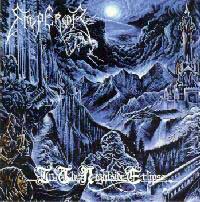
Copyright © 1994 Century Media
|
Percussion work carries the song by shifting a framework of inevitability around the fantastic chaos of guitar noise and simple rhythmic patterns; unfolding architectural pseudopods of power chord scales descend into the panoramic expanse of rhythm, stirring it with the chaos that engenders the evolution of the next phrase.
This is the method of composition; each song within this construction is musical, intense, alive, and violent. Also sad, melancholic, dark and fatalistic, these songs breathe an emotional nihilism but a deep inner hope for the powers of darkness -- to invoke the obscure in rebellion against the normative powers of society. Anarchistic and free, music whips through tracks that resemble more an album than a collection of songs.
Abundant variety arises from simple essential ideas, sometimes tedious where it does not expand any relevance to the reader but interesting, intriguingly expressive in its motions. Intensely composed and expressive in its range of context.
|
Reverence
Candlelight
|
1996
|
|
|
Production: Clean and assertive production enables distinction of sound but allows some atmospheric interaction in the style of the last Emperor album, but with distinct instruments and tonal preservation, despite thin and digitally fragile guitar tone.
Review: With a three-song EP distant wizards Emperor return to the scene which, once cofounded by their work, now wanders vapid into the land of atmospheric cheese-rock in a desperate attempt to continue the flagellation of deceased equine long enough to retire dishonorably.
Counteraction comes in the composition behind what Emperor have wrought, which is both excellent and heartlessly vacant, the latter more pronounced in relative opposition to their older work and in that illustrative of the crisis of this work: it lacks the intensity and direction of older works which stood farther apart from the herd.
The first song, "The Loss and Curse of Reverence," immediately distinguishes itself from older Emperor in the rhythmic changes from the revamped percussion section, which cycles precisely under the music but achieves less integration than a framing of other riffs into a self-renewing vector.
Tracklist:
1. The Loss and Curse of Reverence
2. In Longing Spirit
3. Opus a Satana
Length: 16:29
|
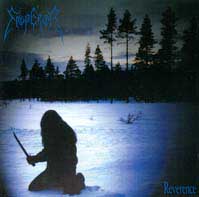
Copyright © 1996 Candlelight
|
More appealingly simplistic patterns unfold in harmony under hookingly energetic beats, and riffs are more moulded into each song than created as load-bearing elements, but the compositional savant in Emperor holds the entire song together as a melodic, panoramic, and yet precision rendition of a distant reality.
Lyrics, printed helpfully on the booklet, are far more conversational and direct than previous Emperor work, almost self-justifying... this opening track twists and bends through riff structures but keeps its coherence through harmony, lending aid through the discadenced screech of distorted vocals, breaking the more diligent application of rhythm to speech in favor of tone.
"In Longing Spirit" follows, an older song reworked for this album, but remains mostly insubstantial. A rotational rhythm breaks in and out of verse-chorus bouncing and delivers occasional simple epiphanies in major notes of the melody, but most of this song is a five-chord rolling backdrop for the Broadway-style semiotic gestures of the infernal voice.
Following that "Opus A Satana" delivers a reasonably orchestrated but not classical caliber "classical" version of Inno a Satana, seeming indifferent in the face of Emperor's previous diligent creativity toward making atmosphere and power out of noise. Mostly this just seems like an overblown post-retirement keyboard aerobic cut of a great Emperor song, since the accentuating touches are melodramatic and empty gestures in the style of bad musicals and operatic tributes to pop artists.
In the continuing work of Emperor hope lies undistinguished from the rest of a host of additions of questionable taste, although to what effect their permutations reach remains unseen. On one side is the new logo, with a pentagram behind it, and the full-facial photo of the band once obscure with the night, but on the other are the variations and significance in the first track which suggest a band pushing hard for stylistic and compositional techniques to supersede the status quo of black metal. Upon whichever hand your sympathies fall, the hardline remains that behind the growing pains of a survivor's band an intellect works to create power and beauty unleashed in the freedom of a spirit surpassing its world.
|
Anthems to the Welkin at Dusk
Century Media
|
1997
|
|
|
Production: More discernible instrumentals provide better production for this Emperor disk than any of its predecessors, but correspondingly more exaggerated mixing is a scarifying error.
Review: In order to produce a black metal album for the current scene venerable Emperor have succumed to a desire to stray from what made them great, to what people remember about what made them great. Every aspect of this album seems an aesthetic venture aimed to duplicate the success of a previous album with a more accessible album tastier in its micro-elements (overall more consistent speed, more narrative and vocal melodies, evil growling offset against clean singing) but none come close to the opposite end of the spectrum, which is what made Emperor great: unity.
Tracklist:
1.Alsvartr (The Oath)
2.Ye Entrancemperium
3.Thus Spake The Nightspirit
4.Ensorcelled By Khaos
5.The Loss And Curse Of Reverence
6.The Acclamation Of Bonds
7.With Strength I Burn
8.The Wanderer
Reverence EP
9.In Longing Spirit
10.Opus A Satana
11.(CD-ROM video data track)
|

Copyright © 1997 Century Media
|
Chaotic blasting riffs follow each other in a sequence best explained by rhythmic similarities and then cycle through predictable constructions in support of the overall composition. The drifting melodies and symphonic compositions of harmony that marked "In the Nightside Eclipse" as an epic of complex metal are replaced by rippingly fast, two or three note riffs in the style of later Enslaved thrown in a mixture of melting keyboards and sliding tempo changes. While the voice of Ihsahn remains immensely strong when distorted, his clean voice is beautiful, but the notes he sings are usually designed to appeal more to the mainstream mind than to fit into an artistic creation.
Despite having every element of a good metal recording, this one doesn't have it. The songs are not structured in the ways that made them express a deepening range of emotions, and consequently all of the textural efforts to create this effect emerge as aesthetic melodrama. Even the song sequence is structured to ape the dramatic landscapes of emotion put together in the previous effort. Where aesthetics count, this is an improvement, but at the heart of the music, a fundamental letdown.
|
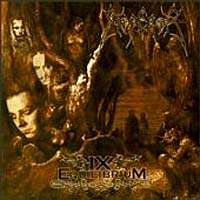
1. Curse You All Men!
2. Decrystallizing Reason
3. An Elegy Of Icaros
4. The Source Of Icon E
5. Sworn
6. Nonus Aequilibrium
7. The Warriors Of Modern Death
8. Of Blindness & Subsequent Seers
9. Outro
|
IX Equilibrium (Century Media, 1999)
When the impetus is gone but the motivation remains, often what occurs is something like this album. Technically each piece of it is well-assembled and of a coherent musical lineage, however the album as a whole fails to express what had once made Emperor albums great, that is, a sense of grandeur in existential experience. By tearing out the base of the perceptual frame in which the listener operated, Emperor were able to articulate thematic conflict which revealed a depth to otherwise indistinguishable territory. Here there are very clear songs, and the cuteness has begun, which we can witness in the full facial shots of the Emperor boys blended into the cover, the clever songtitles with little relevance, and often trivial mechanisms in othewise potent song concepts. It is far from doofus music, but what separated Emperor from over a million other shredder groups is that they once had a desire to write a form of majesty in emotion through music, but now their passions are in the work aspect of producing another album.
|
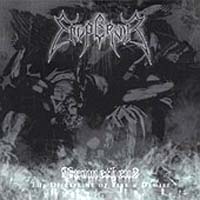
1. The Eruption
2. Depraved
3. Empty
4. The Prophet
5. The Tongue of Fire
6. In the Wordless Chamber
7. Grey
8. He Who Sought the Fire
9. Thorns On My Grave
|
Prometheus: The Discipline of Fire and Demise (Century Media, 2001)
Continuing the slide into years of decay, Emperor unleash an album of often technically stunning riffs which are placed into simple songs with basic concepts in a style that distinguishes the "new Emperor" from his old. While the strength of instrumentalism and songwriting skills often seem to carry them through, the boys from Emperor run into trouble when the necessary bonding of concept to music to lyrical structure cannot be completed and what is instead is the exercise in basic musical statement that leaves no one in the audience wondering. Songs are clearly dualistic, with each half reflecting the other in the most-repeated theme, but even the structural detours Emperor employ lack focus - there is no concept except that of scattered songs, thus no concept in sound for which to aim, and the result is an amalgamation of black metal techniques and known juxtapositions of emotional logic, yet there is no connection from the unknown to the unknown and thus really no mystique or majesty to this album. For black metal of its day it is perfectly competent, but no more, and not of an enduring power of listenability.
|
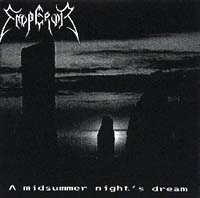
1. Into the Infinity of Thoughts
2. I am the Black Wizards
3. The Burning Shadows of Silence
4. Night of the Graveless Souls
5. Towards the Pantheon
6. Cosmic Keys to My Creations & Times
7. Wrath of the Tryant
8. Inno a Satana
9. Beyond the Great Vast Forest
|
A midsummer night's dream (1995)
A crowd recording of Emperor at the time of their "In the Nightside Eclipse Material," this lengthy recording of legendary material suspends its songs in the muffling effects of distance and obstacle yet remains amazingly listenable as these neoclassical black metal epics emerge from the chaos. The concert appears to be strongly faithful to the original as it would sound without the layering of keyboards, and vocals are thicker and heavier while guitars are thinner and louder, sounding more clearly individual notes than the distortionfest that was the album, so that one can hear more of the underlying pattern without transcribing it. This work is more worthy of purchase than certain official live units.
|
BLACK | DEATH | HEAVY | SPEED | THRASH | GRINDCORE
Copyright © 1988-2003 mock Him productions
|






